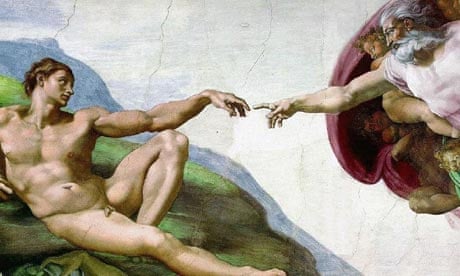Two traditional beliefs held by Christians, Jews and Muslims are that God created the world and that he did it for a purpose — creation and design.
Creation is a religious concept, not a scientific one, so we don't teach it in science. But neither can science justifiably deny it. Creation is the bringing-into-being and sustaining-in-being of everything there is. It is independent of any particular processes.
Scientific studies of origins can answer 'what were these processes?', but not 'are they the actions of God?' The latter question is one, in the words of the National Curriculum, 'that science cannot address'.
Currently, science indicates an Earth some 4.6bn years old, but some people think the Genesis account of six "days" requires a geologically young Earth of 6,000-10,000 years. But that is not so. The historian, Professor David Livingstone, summarised a 19th-century perspective, when he wrote in Darwin's Forgotten Defenders in 1987 that, "by and large, Christian geologists had both encountered and accommodated the issue of the age of the Earth long before the appearance of Darwin's theory".
The latter half of the 20th century saw a resurgence of young Earth creationism. It is the "young Earth" part that has caused a furore, since it runs counter to mainstream science and therefore has no place in science teaching – only in the history of science. So, is this belief required by the Genesis text? Interestingly, as early as around AD225 Origen, one of the early church fathers, wrote about the creation of the sun, moon and stars on day four of the Genesis account:
What man of intelligence, I ask, will consider as a reasonable statement that the first and the second and the third day, in which there are said to be both morning and evening, existed without sun and moon and stars…?
He, and others knew full well that 24-hour-days with mornings and evenings were meaningless before the sun and other stars arrived on "day" four. The Biblical text is apparently using a literary device and therefore those who insist on 24-hour-days actually need to treat the text much more carefully. A literal interpretation distracts from teaching about creation. People commonly think that by dismissing a young Earth (rightly, from current scientific evidence), they have removed the idea of creation – which they haven't. They have just confused creation and creationism.
Another own goal lies in the arguments of the intelligent design movement. This claims that there are biological systems that are "irreducibly complex", meaning that they only work if no components are missing, and therefore could not have evolved from less complete systems. According to ID's proponents, such systems have no natural explanation and therefore provide evidence for intelligent design.
But this overlooks how intermediate components of evolutionary processes serve different functions at different stages of their evolutionary past, which torpedoes the argument. No one knows whether a natural explanation will be found tomorrow. If so, on ID reasoning, it appears that intelligence is no longer required.
Earlier claims that the development of immune systems and blood-clotting processes could not be accounted for by evolutionary change are now known to be incorrect. Furthermore, if irreducible complexity is the mark of intelligence, what about the rest of creation? If current gaps in scientific knowledge are where God acts, ID appears to be using a contemporary version of the "god-of-the-gaps".
Charles Coulson, first professor of theoretical physics at King's College London, coined this phrase in 1955 and commented from a Christian standpoint:
If [God] is in nature at all, he must be there right from the start, and all the way through it … When we come to the scientifically unknown, our correct policy is not to rejoice because we have found God: it is to become better scientists.
Both of what I have suggested are own goals provide unnecessary, and unserviceable, ammunition for religion's detractors.
In attempting to defuse some current tensions over teaching about origins I have argued that both belief in a young Earth and the spurious argument of ID can be rejected, without providing grounds for rejecting the traditional concepts of creation and design held by Christians, Jews and Muslims.
Michael Poole, visiting research fellow in science and religion at the department of education and professional studies, King's College London. He was a member of the working party which drew up the government's guidelines on teaching evolution and creationism. His book, User's Guide to Science and Belief was published last year.

Comments (…)
Sign in or create your Guardian account to join the discussion